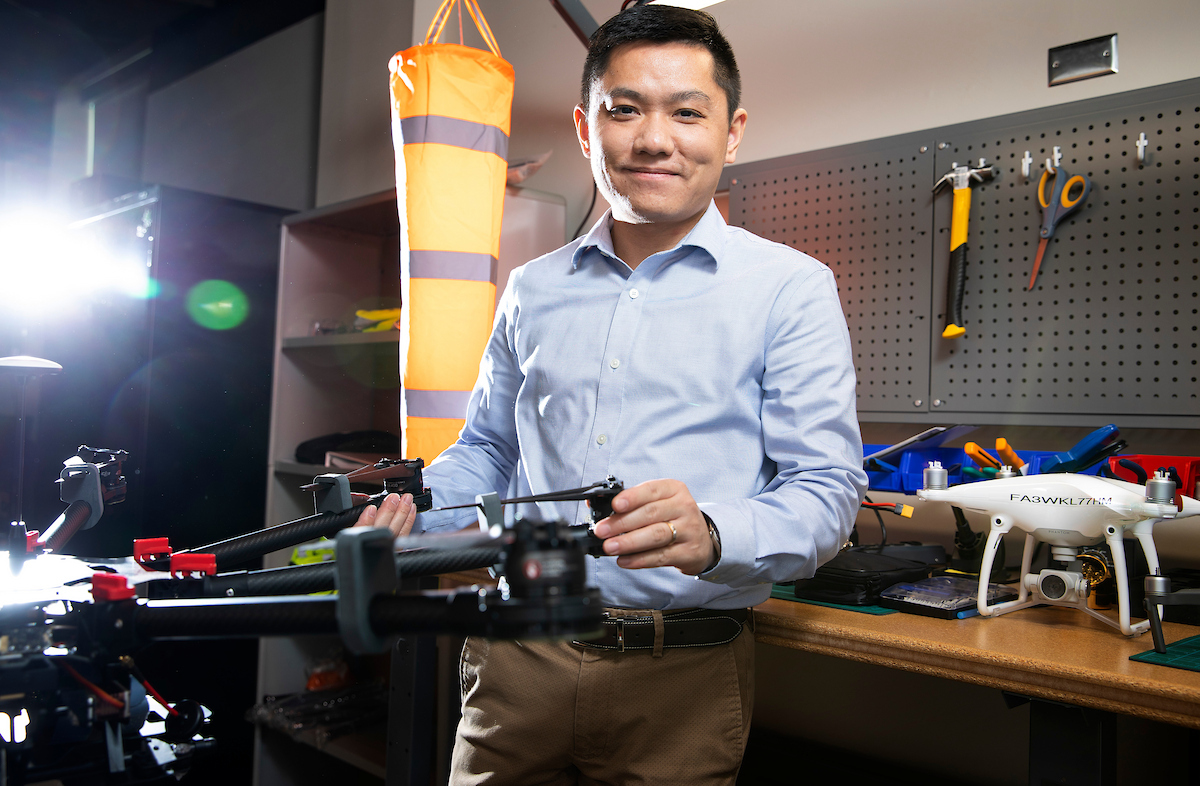UNO’s Drone Program Secures NSF Grant to Boost Drone Technology for Tribal Communities
- published: 2024/10/11
- contact: Jennifer Knight - College of Public Affairs and Community Service
- phone: 402.554.2625
- email: jenniferknight@unomaha.edu

The University of Nebraska at Omaha (UNO) has taken another step forward in drone technology education and research with the recent awarding of a $75,000 grant from the National Science Foundation (NSF). The grant will fund a project aimed at enhancing community resilience in underserved tribal areas, with a focus on mitigating wind hazards such as tornadoes and straight-line winds. This initiative is part of UNO's Unmanned Aerial Systems (UAS) program, launched in 2017 by the Aviation Institute, preparing students for a future where drones play a key role in various industries, from agriculture to public safety.
NSF Grant Aims to Boost Tribal Resilience
Under the guidance of Victor Huang, Ph.D., associate professor with UNO’s Aviation Institute, the NSF grant marks a key milestone for the UAS program, launching a project to improve disaster resilience in tribal communities, beginning with the Omaha Tribe in Macy, Neb.
"Many homes in tribal areas are not as strongly built as government structures, and some residents, like seniors or disabled individuals, are unable to maintain their properties," says Huang. "These factors make them more vulnerable to wind damage, especially during tornadoes or severe storms."
Drones will be used to create high-resolution geospatial maps of these areas, providing more detailed data than satellites. In addition to pre-disaster assessments, the project will also focus on automating post-disaster damage evaluations through drone imagery, reducing subjectivity and speeding up recovery efforts.
The project, which kicks off in October, will bring together a multidisciplinary team of experts from UNO, the University of Nebraska-Lincoln (UNL), and various others with expertise in digital governance, tribal management, GIS, meteorology, and artificial intelligence (AI).
The initial grant, the only one of its kind in Nebraska, starts with a six-month planning phase, during which the team will lay the groundwork for a larger proposal. If successful, the stage two grant will involve a one-year project funded at $1 million, during which the team will develop a prototype system for evaluating community resilience.
As part of the planning phase, Huang, along with other team partners, will attend a training session in Washington, D.C., hosted by the NSF this upcoming spring. There, past grant recipients will act as mentors, helping the team prepare and refine the proposal and ensuring it meets NSF’s criteria for continued support.
The goal is to create a tool that integrates GIS, drone-based AI models, and weather resistance analysis."
"We’re optimistic about securing the next phase of funding," said Huang. "The goal is to create a tool that integrates GIS, drone-based AI models, and weather resistance analysis. This won’t just be a product—it will be a research prototype that we can eventually scale to assess other vulnerable communities."
Drone Program on the Rise
As the UAS program continues to explore innovative research projects like the NSF-funded initiative, it also equips students with the essential skills to apply drone technology in a wide range of industries, including public safety, infrastructure, and agriculture.
UNO’s UAS program is housed within UNO's Aviation Institute, which offers a Bachelor of Science degree with three concentrations:Professional Flight, Air Transport Administration, and Uncrewed Aircraft Systems. While students in the UAS concentration don’t train to build drones, students acquire the critical skills necessary to operate and apply drone technology. Students gain hands-on experience and graduate with a Part 107 certification, which allows them to operate drones commercially. In addition, partnerships with local and regional businesses, including Valmont Industries and the Nebraska Department of Transportation (DOT), have allowed students to gain real-world experience through internships and full-time positions.
The program also recently introduced a UAS minor, opening the door to students in fields such as communications, natural resources, engineering and similar industries.
Expanding into Agriculture
In recent years, drone use in agriculture has seen a significant rise, particularly for crop dusting and farmland inspection. According to Dr. Huang, drones offer a more economical and environmentally friendly option compared to traditional crop-dusting airplanes. "Drones allow for precise targeting of specific areas that need treatment, which reduces waste and minimizes environmental impact," Huang explains.
The adaptability of drones also comes into play in wind turbine areas where airplanes face restrictions.
"Drones can easily navigate around obstacles like wind turbines, making them ideal for areas where traditional crop dusting is not feasible," said Huang.
As drone technology continues to evolve, demand for skilled operators in agriculture and other industries is expected to grow, creating opportunities for workforce development in the UAS field.
Already, two of Dr. Huang’s students have started agriculture-based drone companies, including drone pilot Jesse Reid. Reid, a UNO alumnus who graduated from the UNO Aviation Institute, owns and operates a company that sprays crops with herbicides, fungicides, or insecticides as needed. Reid’s Iowa-based company is called Precision Arial Solutions.
An Exciting Future for Drone Research
While the NSF grant is a major win for UNO’s UAS program, it’s just the beginning of a larger effort to integrate drones into emergency management and community planning. Huang believes that research like this will provide students with invaluable real-world experience, preparing them for a rapidly evolving job market.
"There’s a lot of opportunity in drone technology," Huang says, "but we need to continue building industry acceptance and finding instructors who can help grow the program."
With the NSF’s backing, UNO’s UAS program is poised to make a significant impact, both in the classroom and in communities across the region.